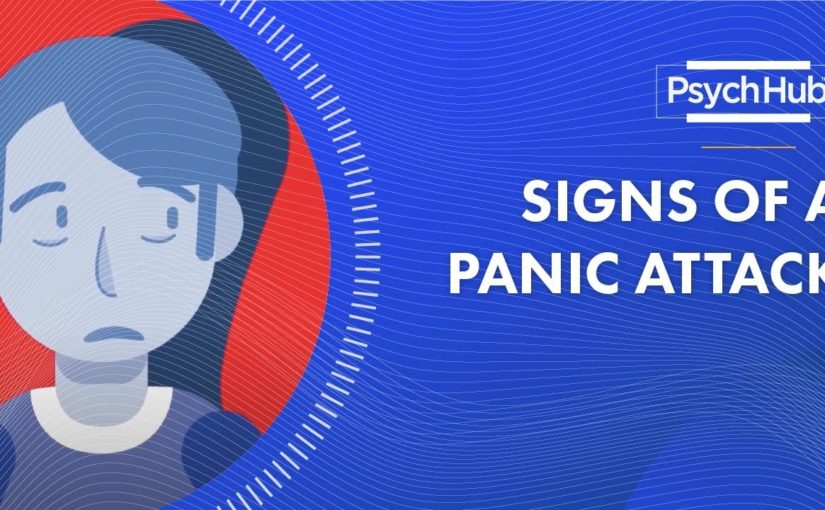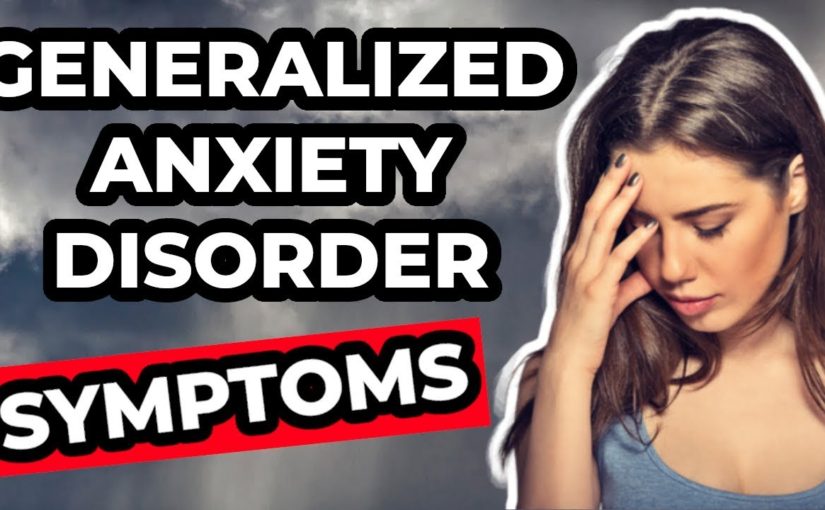I thought I was dying. It felt like I was having a heart attack. (sirens wail) I ended up in the ER to make sure I wasn’t. I got tunnel vision and I couldn’t breathe. I felt like I would pass out for sure. Now I’m scared every day. What if it happens again? These are the voices of people who have had panic attacks. Once a person has even a single panic attack, the worst part can be the intense fear that it will happen again. I know, I’ve lived with that fear. My first panic attack happened on a day when things were going fine.I was with my friend from work, we were driving home in rush hour traffic. It was busy, like always. I was talking to my friend while she drove and she was focusing on the road. All of a sudden, I couldn’t breathe. My chest was tight, my palms started sweating, and my heart pounded faster. And it was rising like it was in my throat or ears. I looked at my friend and the car seemed to get smaller around us. I was positive I was dying, right then and there.
0:01:24.418,1193:02:47.295
And I don’t want to die. I was so scared, and she could tell. She asked if I was okay and I shook my head no.I couldn’t speak. She pulled over and called 911. After lots of tests, doctors in the ER told me my heart was fine. They said I was having a panic attack and that they’re pretty common. They gave me ideas about how to get help. The reason for a panic attack is sometimes clear, and sometimes a mystery. Panic attacks are a group of physical and mental health symptoms that happen all at once. Because of the intense physical sensations and anxiety, people can feel like they’re dying.Some symptoms are a pounding heart, trouble breathing, chest pain, feeling tingly or light-headed, and tunnel or blurred vision. People also feel terror, like something awful is about to happen. For me, that moment in the car was like any other day until it happened. As a result, people change the things they do, Either way, because a panic attack is the way they interact with others, their activities, are so scary, that once people have one, they’re often afraid it will happen again. and even how much they go to work or school. This collection of symptoms is known as panic disorder. Sometimes this becomes so serious that people stop leaving their houses to avoid places and situations where an attack might happen. But treatment helped me. And treatment is available. This is called agoraphobia. I found a great therapist who knew what to do. For me, with a combination of medicine and therapy, I learned to live with the fear of future panic attacks and know what to do if one starts to happen.Panic attacks don’t have to control your life. You can take that control back. I know I did.
100 Hot BooksComputers LaptopsExplaindio Agency Edition FREE Training How to Create Explainer Videos & SELL or RENT them! Join this FREE webinar | Work Less & Earn More With Explaindio AGENCY EDITION
AFFILIATE MASTERY BONUS: 6-Week LIVE Series Has Begun!
FunnelMates $46.⁹⁵ Replays are Instantly Available. Want A Profitable Mailing List But Not Sure Where To Begin? We’ll Guide You, Equip You, and even PAY You Cash To Do It!

☃in 5-10 Minutes A Day Using Automation Software and our Time-Tested Strategy See How Your New Site Can Be Live In Just 27 Seconds From Now!
Funnelify you will be able to create high-quality converting leads pages, affiliate pages, sales pages, sales funnels, and business pages, and you will never need to pay a web designer again.

 FunnelMates $46.⁹⁵
FunnelMates $46.⁹⁵ AFFILIATE MASTERY BONUS: 6-Week LIVE Series Has Begun! Replays are Instantly Available.Want A Profitable Mailing List But Not Sure Where To Begin? We’ll Guide You, Equip You & Even PAY You Cash To Do It!5-10 Minutes A Day Using Automation Software & Our Time-Tested StrategySee How Your New Site Can Be Live In Just 27 Seconds From Now!“Today You’ll
Get Access To The Complete FunnelMates Suite, Traffic Automation Software Tools & Our Beginner Friendly 6 Week Affiliate Masterclass (Inc. Recordings) Responsible For Taking 1,000 Of Complete Affiliate Zero’s To Legendary Affiliate Marketing Hero’s”
FunnelMates Is The FIRST EVER
System That Simplifies List-Building Affiliate Funnels
To Something Anyone Can UseIn Fact … On Average, Out Of Every 100 People Who Visit On Your Pages3% are ready to buy 30% don’t think they’re interested
6-7% are open to the idea 30% KNOW they’re not interested
6-7% are open to the ideaLong Story Short, 97% Of People
Just Aren’t Ready To Buy From You Right Now…
 AFFILIATE MASTERY BONUS: 6-Week LIVE Series Has Begun! FunnelMates $46.⁹⁵ Replays are Instantly Available. Want A Profitable Mailing List But Not Sure Where To Begin? We’ll Guide You, Equip You, and even PAY You Cash To Do It!
AFFILIATE MASTERY BONUS: 6-Week LIVE Series Has Begun! FunnelMates $46.⁹⁵ Replays are Instantly Available. Want A Profitable Mailing List But Not Sure Where To Begin? We’ll Guide You, Equip You, and even PAY You Cash To Do It!  ☃in 5-10 Minutes A Day Using Automation Software and our Time-Tested Strategy See How Your New Site Can Be Live In Just 27 Seconds From Now!Funnelify you will be able to create high-quality converting leads pages, affiliate pages, sales pages, sales funnels, and business pages, and you will never need to pay a web designer again.
☃in 5-10 Minutes A Day Using Automation Software and our Time-Tested Strategy See How Your New Site Can Be Live In Just 27 Seconds From Now!Funnelify you will be able to create high-quality converting leads pages, affiliate pages, sales pages, sales funnels, and business pages, and you will never need to pay a web designer again.
 FunnelMates $46.⁹⁵ AFFILIATE MASTERY BONUS: 6-Week LIVE Series Has Begun! Replays are Instantly Available.Want A Profitable Mailing List But Not Sure Where To Begin? We’ll Guide You, Equip You & Even PAY You Cash To Do It!5-10 Minutes A Day Using Automation Software & Our Time-Tested StrategySee How Your New Site Can Be Live In Just 27 Seconds From Now!“Today You’ll Get Access To The Complete FunnelMates Suite, Traffic Automation Software Tools & Our Beginner Friendly 6 Week Affiliate Masterclass (Inc. Recordings) Responsible For Taking 1,000 Of Complete Affiliate Zero’s To Legendary Affiliate Marketing Hero’s”FunnelMates Is The FIRST EVER
System That Simplifies List-Building Affiliate Funnels
To Something Anyone Can UseIn Fact … On Average, Out Of Every 100 People Who Visit On Your Pages3% are ready to buy 30% don’t think they’re interested
6-7% are open to the idea 30% KNOW they’re not interested
6-7% are open to the ideaLong Story Short, 97% Of People
Just Aren’t Ready To Buy From You Right Now…
FunnelMates $46.⁹⁵ AFFILIATE MASTERY BONUS: 6-Week LIVE Series Has Begun! Replays are Instantly Available.Want A Profitable Mailing List But Not Sure Where To Begin? We’ll Guide You, Equip You & Even PAY You Cash To Do It!5-10 Minutes A Day Using Automation Software & Our Time-Tested StrategySee How Your New Site Can Be Live In Just 27 Seconds From Now!“Today You’ll Get Access To The Complete FunnelMates Suite, Traffic Automation Software Tools & Our Beginner Friendly 6 Week Affiliate Masterclass (Inc. Recordings) Responsible For Taking 1,000 Of Complete Affiliate Zero’s To Legendary Affiliate Marketing Hero’s”FunnelMates Is The FIRST EVER
System That Simplifies List-Building Affiliate Funnels
To Something Anyone Can UseIn Fact … On Average, Out Of Every 100 People Who Visit On Your Pages3% are ready to buy 30% don’t think they’re interested
6-7% are open to the idea 30% KNOW they’re not interested
6-7% are open to the ideaLong Story Short, 97% Of People
Just Aren’t Ready To Buy From You Right Now…


